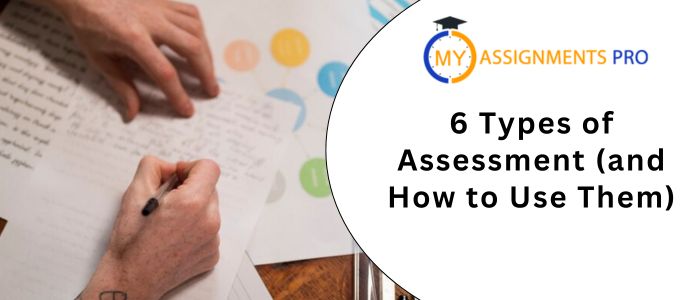
Fundamental to the educational process, assessments are instruments for assessing, promoting, and improving student learning and the efficacy of instruction. They assist teachers in determining where pupils stand intellectually and how best to support their growth, going beyond simply issuing grades. In a similar vein, students learn about their strengths, areas for improvement, and development. The proper kind of assessment makes learning more purposeful and teaching more focused. From testing beginning knowledge to measuring ultimate outcomes, evaluations come in a variety of forms, each with a distinct function. Learning how to use these many forms of assessments and comprehending them can greatly enhance academic achievement. Whether you're a teacher creating lesson plans or a student getting ready for a test, the correct assessment help can make all the difference. My Assignments Pro is your go-to assessment aid, providing resources and expert advice to help you thrive at every level of your academic career.
Diagnostic Assessment: Understanding Student Starting Points
Knowing where each student stands in terms of prior knowledge, abilities, and comprehension is crucial before successful teaching can start. This is when diagnostic evaluation is useful. This kind of evaluation, which is frequently called a "pre-assessment," is carried out at the beginning of a lesson, unit, or course. Finding a student's present knowledge level, any learning gaps, misconceptions, and strengths is its main goal. As per our assessment help experts, diagnostic tests are solely informational and intended to assist teachers in customizing their instruction to each student's specific requirements; unlike other tests, they are not graded. Let's see how we can make good use of it.
- Before introducing new subjects, create idea maps or quizzes.
- Examine both individual and class results to find any common areas of confusion or weakness.
- For differentiated education, strategically group students according to their comprehension.
- Plan lessons, establish objectives, and offer focused assistance based on the results.
Without the appropriate resources, navigating diagnostic tests can be difficult for both teachers and students. For this reason, My Assignments Pro provides professionally crafted materials and advice to assist you in putting into practice efficient diagnostic techniques. As your go-to assessment helper, we make sure that learning gets off to a great start by determining students' precise locations before determining their next steps.
Formative Assessment: Tracking Progress in Real-Time
One efficient, ongoing way of monitoring student learning and providing constant feedback in class is formative assessment. Formative assessments occur throughout the learning process, as contrasted with summative tests, which measure learning at the end. This allows teachers to adjust instruction in real time and students to identify areas for improvement early on. Improving learning as it happens, instead of just testing it later on, is the primary aim. Here's how we can utilize it to good effect:
- Include short-term, low-stakes assessments like polls, exit tickets, think-pair-share, and one-minute reflections.
- Give pupils prompt feedback so they may recognize their errors and fix them before continuing.
- To gauge comprehension during activities, use talks and observations.
- Adapt your teaching methods in light of the performance and replies of your students.
Formative evaluation keeps students interested and promotes active engagement. Our assessment helpers can aid teachers in developing interesting lesson plans and students looking for targeted support. As your assessment partner of choice, we offer expert guidance, interactive materials, and tailored solutions to assist you in making the most of formative assessments for your academic achievement.
Summative Assessment: Evaluating Final Outcomes
Summative evaluations of students' learning are usually carried out after class time. After finishing a unit, course, or program, it gives a clear picture of the information, abilities, and comprehension a student has gained. Final exams, research papers, standardized tests, and end-of-term projects are typical examples. Summative tests are high-stakes and typically graded, setting a standard for academic performance in contrast to formative tests. Let's see how we can make good use of it:
- In order to match assessment assignments with anticipated results, clearly identify learning objectives at the start of the course or unit.
- To evaluate various skills, use a range of assessment forms, including written exams, portfolios, and presentations.
- Use established rubrics to guarantee uniform and transparent grading.
- Examine performance patterns to pinpoint areas that need work for upcoming training or research.
Summative evaluations are essential for both academic advancement and prospects. But for a lot of students, getting ready for them can be daunting. My Assignments Pro can help with that. As a reputable assessment helper service, we offer professional writing services, specialized resources, and knowledgeable academic support to help you do well on your summative exams. Reaching high grades is not only feasible but also achievable with the correct assistance.
Ipsative Assessment: Measuring Personal Improvement
Ipsative assessment is a special kind of evaluation that is very individualized and concentrates on a person's development over time rather than comparing them to their classmates. It compares a student's present performance to their earlier work, emphasizing development, consistency, and progress. This kind of evaluation is particularly inspiring since it pushes students to compete with themselves, which develops a growth mentality and self-awareness. This is how we can use it effectively:
- To record development, keep track of your progress using learning journals, portfolios, or self-assessment logs.
- At the beginning of a learning period, establish clear, attainable goals and go over them frequently.
- Give thoughtful criticism that emphasizes the student's progress rather than merely where they are now.
- Celebrate little successes to boost self-esteem and inspire further development.
Self-directed learning and long-term development are best supported via ipsative assessment. Even if it's not often applied to official grades, it's quite important for empowering students to take charge of their education.
If you're not sure how to properly administer or react to ipsative assessments, My Assignments Pro can assist you. Assessment helpers provide goal-tracking tools, individualized support, and professional insights as your dedicated assessment assistant to make sure every student understands and appreciates their academic progress. Because being better than you were yesterday is what true success is all about, not just being better than other people.
Norm-Referenced Assessment: Comparing Student Performance
The purpose of norm-referenced assessment is to compare and measure a student's performance to that of a broader group, sometimes a national or standardized sample. Assessing a student's performance in comparison to their peers is just as important as figuring out what they know. Standardized tests such as the SAT, GRE, or other competitive exams are frequently used examples. These tests are frequently used for academic ranking, placement, and admissions. Let's examine some effective ways to use it:
- Give out standardized assessments that have been normed for particular age or grade levels and statistically validated.
- Analyze scaled scores and percentile ranks to determine a student's position among their peers.
- Utilize the findings while making academic judgments about scholarships, program placements, or recognizing gifted students.
- To guarantee a comprehensive picture of student competence, balance norm-referenced data with alternative forms of evaluation.
Norm-referenced tests can be stressful and competitive, yet beneficial for external benchmarking. Students often require focused study and strategy to perform at their best.
My Assignments Pro can help with that. As an experienced assessment helper, we offer expert assistance with norm-referenced test preparation, individualized study timelines, and complete performance analysis to allow students to approach norm-referenced assessments with confidence. We wish to assist you to excel, rather than merely compete.
Criterion-Referenced Assessment: Testing Against Defined Standards
Rather than measuring an individual student's performance against that of others, criterion-referenced measurement assesses an individual student's performance against a specific set of learning standards or criteria. The focus is on the knowledge and skills of an individual learner relative to specific goals, skills, or competencies. This type of measurement is often used in professional certification, classrooms, and standardized tests where meeting specific standards is important. As per our assessment helpers, this is how we can use it effectively:
- Before the start of training, clearly define the learning objectives and success criteria.
- Create tests, such as quizzes, practicals, or assignments, that are directly related to the learning objectives.
- To evaluate performance fairly and consistently, use scoring guidelines and rubrics.
- Give them helpful criticism so they may see where they need to improve and which benchmarks they have already reached.
Criterion-referenced tests are the best way to make sure students have mastered key ideas or abilities. When assessing proficiency in areas like language, math, and vocational training, they are very helpful.
Making sure the format and expectations are correct is essential, whether you're designing these tests or getting ready to take them. Your go-to resource for assessment assistance, My Assignments Pro, is here to help you at every stage. Our assessment helpers assist you in confidently meeting and surpassing academic requirements, from establishing learning objectives to producing excellent solutions.
Conclusion: Use the Right Assessment to Elevate Learning Outcomes
Every kind of assessment has a distinct function in the learning process. When utilized properly, these six assessment kinds can be very useful tools for teachers and students, helping with everything from determining learning gaps to evaluating final performance.
Students and teachers frequently need expert advice to maximize these tactics, which is where My Assignments Pro comes in. We offer specialized assistance for all kinds of assessments as your go-to assessment helper, whether you're studying for diagnostic examinations, acing summative exams, or monitoring your development.
Move further in your academic career by collaborating with My Assignments Pro and letting your tests do the heavy lifting!



